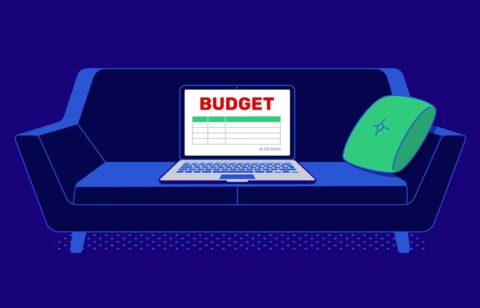
There’s an old saying that opinions are like belly buttons – everybody has one. A lot of people also have opinions about budgeting. If you’re lucky you might have gotten budgeting advice from your mother or father. If so it probably consisted of things such as “have an emergency fund,” “don’t spend more than you earn” or the old standby “a penny saved is a penny earned.” And while this is all good advice, the best comes from the real experts – people who have been there, done that and learned from bad experiences about good budgeting.
It’s great to earn money and the fact is the more the better. But what’s just as important is how you spend it. Even if you’re pulling in big bucks but spending it all recklessly, you’re on your way down a very slippery slope. No matter how much or how little money you have, budgeting how you spend it is one of the most critical skills you can learn.
Here are four top money experts each with a piece of advice that could help you do a better job of budgeting.
Cut back 10% in family spending – Suze Orman
You may be familiar with Suze Orman. She first became well known for her book The 9 Steps to Financial Freedom and for a time had her own TV program on CNN. She also had a six-episode TV series America’s Money Class with Suze Orman on the OWN Network. Suze’s budgeting tip is to cut your spending by 10%. This is enough of a reduction that you should start to see your savings pile up very quickly, which would make it easier for you to pay back any debts and cover your actual important expenses.
The good part according to Orman is that 10% is not enough of a cut that you will feel as if you are depriving yourself or your loved ones of anything. As an example of this, if you’re used to spending $100 on movies and gaming every month and trim that amount down to $90, this is not going to cause mass angst.
Overbudget for groceries – Dave Ramsey
Dave Ramsey has had his own radio show for many years and has made numerous TV appearances. He is a financial author, radio host, television personality, and motivational speaker who may be most famous for having developed the snowball strategy (see the video below) for getting out of debt. Dave’s advice is to overbudget for groceries. He believes that when most of us put together a budget, we don’t consider our grocery bill at all. Even if we do, we tend to severely under budget. So while we may think that we’re putting $100 into savings every month, $80 of that is probably actually going to buy things that we forgot to calculate in our grocery budget.
His advice is that next time you go to the grocery store, keep all of your receipts and then add them up at the end of the month. Make sure that you include the times that you ate out because even though fast food can hardly be considered food, it still technically is. Then after you have added up all those receipts, add $50 to the total – just in case. That will be your real grocery budget and if you go under it, that’s terrific. Going under is always better than going over.
In the event you’re having a problem with debt and wonder about the snowball strategy for becoming debt free, here’s a video courtesy of National Debt relief where Dave explains it.
Look to the past for inspiration – Rick Adelman
Richard Leonard “Rick” Adelman is a retired professional basketball player and coach. He coached for 23 seasons in the NBA (National Basketball Association) and just retired as coach of the Minnesota Timberwolves. His advice is that when you’re putting together a budget you need to go back in time – obviously not too far back. But you should go back at least a year, find your bill history and then add everything up. If possible try to find receipts from your extracurricular activities such as dining out or movies and add them to the final tally. This should give you an excellent idea of how much you will spend this year and you could then budget accordingly.
Of course, if something serious has changed in the past year such as a new higher mortgage, or heaven forbid, septuplets, you need to adjust for that. But if your life has remained essentially the same since a year ago, this would be a great way to prepare for the present.
Have “Magic” spending jars – Gail Vaz-Oxlade
Gail Vaz-Oxlade is a financial writer and TV celebrity who lives in Canada. She is the host of the Canadian television series Til Debt Do Us Part, Princess and author of the book Money Moron. Gail says that she has been told over and over by people that they don’t know how to budget regardless of how many articles or books they’ve read, how many worksheets they downloaded off the Internet or how many times they’ve tried – they just can’t do it. However, once she started the show Till Debt Do Us Part and introduced the concept of “magic” spending jars, many people are now able to budget successfully.
So what are “magic” spending jars? What these are is that once you’ve budgeted for your fixed expenses and your important variable ones such as food, debt payment and gas, take the money you have for clothing, entertainment, travel, dining out and other similar ventures and put it in a jar. You then use the money in the jar only when you are partaking in those fun events. That way you’ll no longer find you’re surprised by suddenly being broke because you just had to get 10 toppings on that pizza.
Just in case you’ve never made a budget
If you’ve never actually sat down to create a budget the advice from these top money managers might be interesting but sort of like listening to a speaker lecturing in Spanish when you don’t understand a word of that language. If this is you, here are some quick tips for creating your first budget.
1. Track your expenses.
Go back and read what coach Rick Adelman said about digging out your old bills. That’s a good start but you really need to know what you’re doing now, which means tracking your spending for at least 30 days. There are numerous smart phone apps available that will make this easy. We happen to like Mint.com because it’s free, easy-to-use and a great budgeting tool. If you use Mint to track your spending it will then categorize it for you so you can see exactly where your money is going.
2. Create categories.
If you’re not using an app or some financial software to track your spending that will automatically organize it into the categories, you need to do this next. Here is a list of some major categories as a starting point. Naturally, you’ll want to tailor this to your own spending meaning that you may need to add and subtract some categories.
• Home
• Utilities
• Food
• Family obligations
• Health and medical
• Transportation
• Debt payments
• Entertainment/Recreation
• Pets
• Clothing
• Investments and savings
• Miscellaneous
3. Divide by three
Once you have your spending divided into categories, you need to group them as follows: fixed expenses, variable expenses and extracurricular expenses. Your fixed expenses will be those that are the same every month such as your mortgage payment or rent, your utility bills, your auto loan(s), credit card debts or a personal loan. Variable expenses will be those that you know you have virtually every month but that very in cost. This would typically include groceries, clothing, investment and savings and transportation. Finally, ‘extracurricular” expenses would be those that you don’t have to spend money on such as dining out, entertainment and clothing.
4. Add up your fixed and variable expenses
Add up your fixed and variable expenses and compare this total to your monthly income. If they exceed your monthly income, you will have to make some radical changes. You’ll need to take a hard look at your variable expenses to see where you could make cuts. Your objective should be to get your spending down to at least 10% below that of your monthly income. The categories where people generally find it easiest to reduce their spending is groceries, clothing and transportation.
If making these cuts still isn’t enough to get you to at least 10% below your monthly income, you’ll have to become more radical. You may have to move to a cheaper house or apartment, trade in your car for a less expensive one or find ways to reduce those credit card debts.
5. Be flexible
Once you develop a budget, don’t think of it as something hard and fast that can never be altered. You will need to continue tracking your spending and then make adjustments based on what you learn. For example, you could find that no matter how hard you try you simply can’t get a month’s worth of groceries for the $400 you had budgeted. So increase your grocery budget accordingly and then find some other category where you could reduce your spending to make up for the money you’ve added to your grocery category. In other words, don’t think of your budget as something engraved on stone. Think of it more as a game plan.





